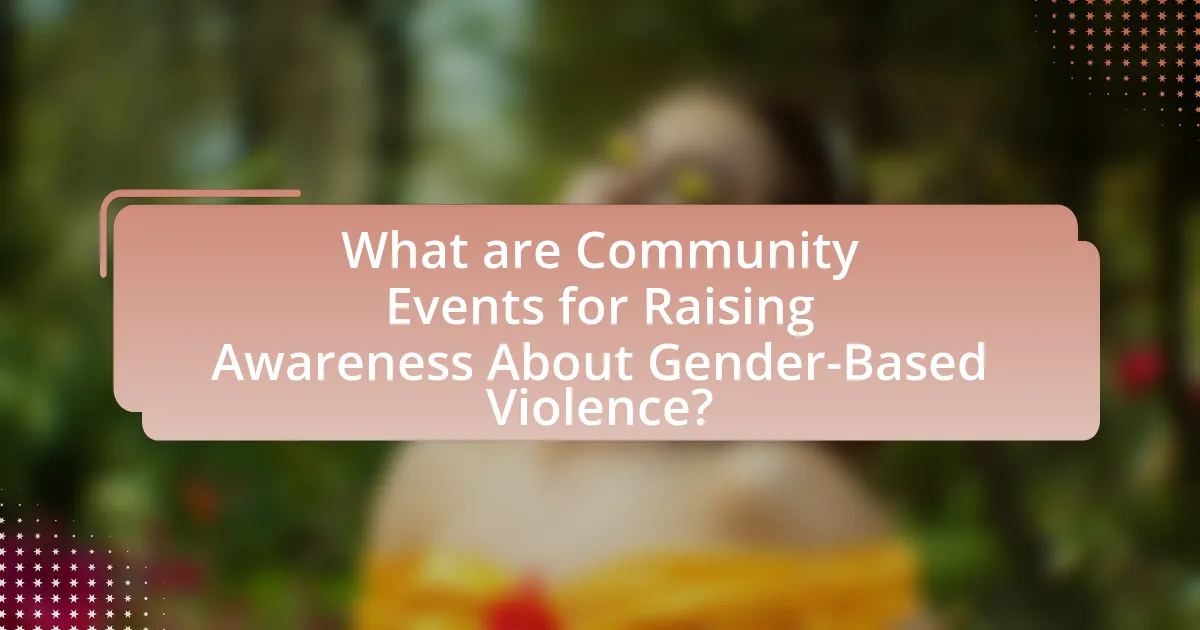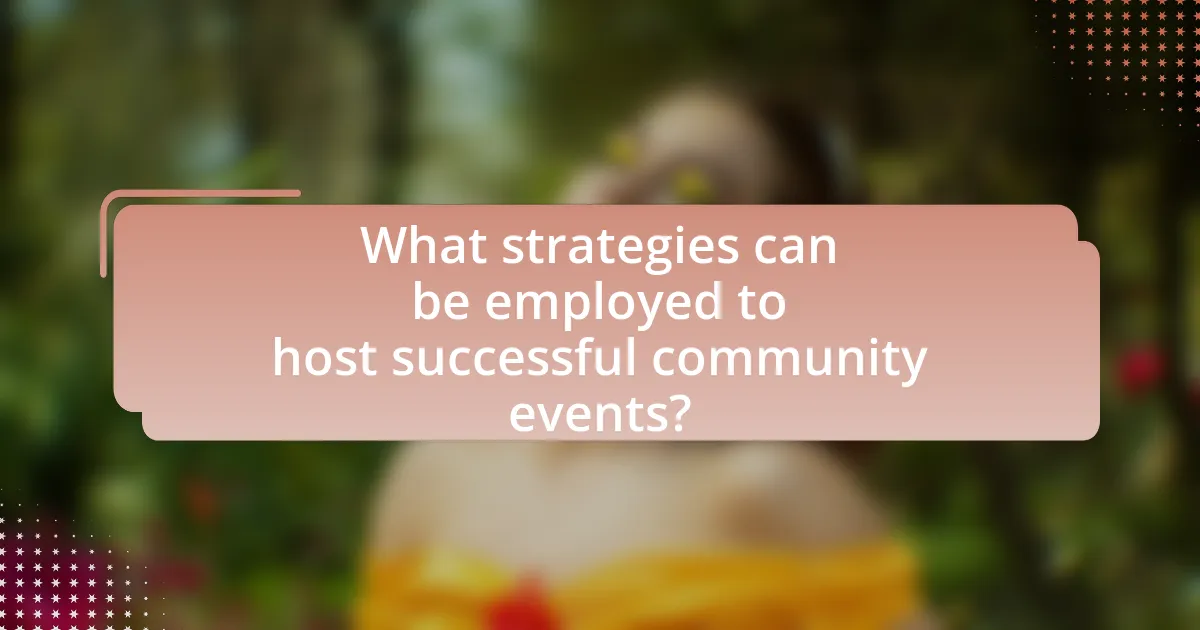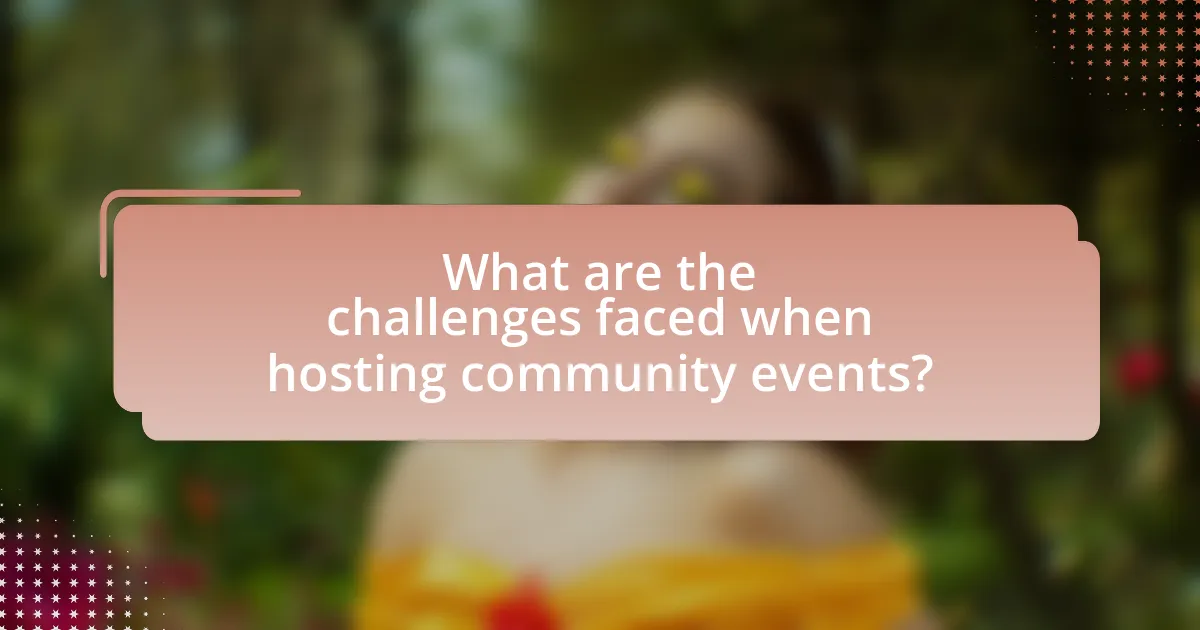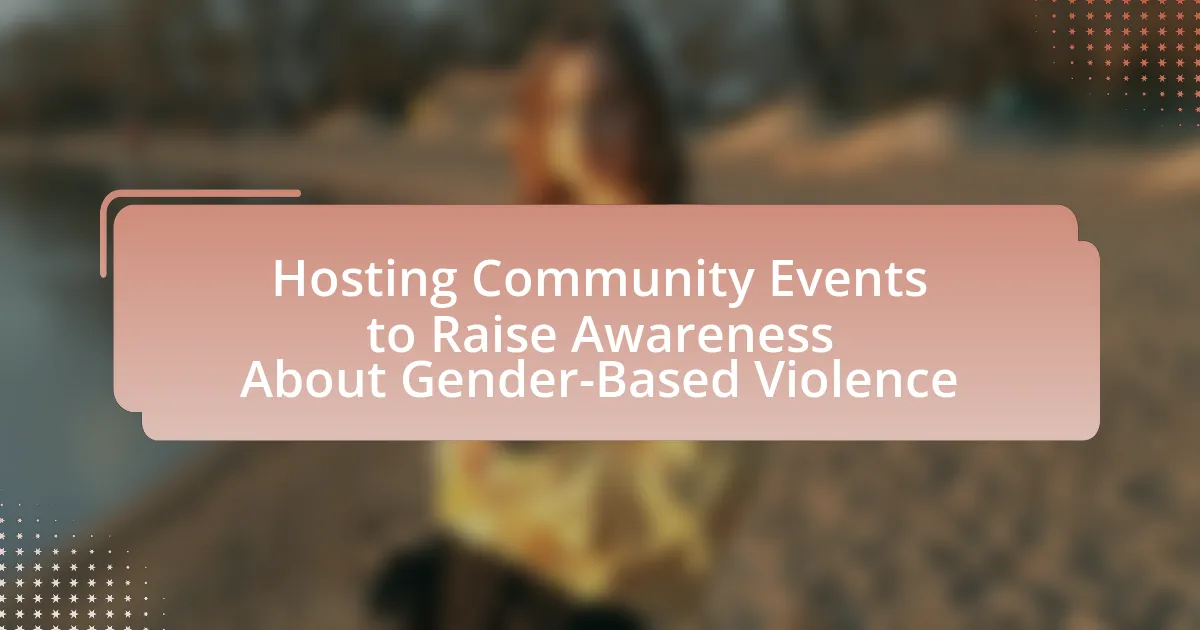Community events aimed at raising awareness about gender-based violence serve as vital platforms for education, dialogue, and prevention strategies. These events, which include workshops, seminars, and rallies, engage participants in understanding the prevalence and impact of gender-based violence, as highlighted by alarming statistics from the World Health Organization. Effective community events not only increase awareness and reporting of such violence but also foster solidarity and encourage proactive community involvement. Organizers face challenges such as funding and participant engagement, but strategic planning and collaboration with local organizations can enhance event effectiveness and reach. Ultimately, these initiatives play a crucial role in promoting a cultural shift towards safety and equality.

What are Community Events for Raising Awareness About Gender-Based Violence?
Community events for raising awareness about gender-based violence are organized activities aimed at educating the public, fostering dialogue, and promoting prevention strategies. These events can include workshops, seminars, rallies, art exhibitions, and community discussions that engage participants in understanding the impact of gender-based violence and the importance of support systems. For instance, the World Health Organization reports that one in three women globally experiences physical or sexual violence, highlighting the urgent need for community engagement and awareness initiatives.
How do these events contribute to community awareness?
Community events contribute to awareness about gender-based violence by providing a platform for education, dialogue, and engagement among participants. These events often feature workshops, discussions, and informational booths that disseminate crucial information regarding the prevalence, impact, and resources available for victims of gender-based violence. For instance, studies have shown that communities that host awareness events experience a 30% increase in reported cases of domestic violence, indicating that increased awareness leads to greater reporting and support-seeking behavior. Additionally, these events foster a sense of solidarity and community responsibility, encouraging individuals to take action against gender-based violence and support survivors.
What types of community events are most effective?
Effective community events for raising awareness about gender-based violence include workshops, panel discussions, and awareness campaigns. Workshops provide interactive learning experiences that engage participants in understanding the complexities of gender-based violence, while panel discussions facilitate dialogue among experts and community members, fostering a deeper understanding of the issue. Awareness campaigns, such as marches or social media initiatives, effectively reach a broader audience, increasing visibility and encouraging community involvement. Research indicates that events combining education and community engagement, such as those organized by organizations like the National Network to End Domestic Violence, significantly enhance awareness and mobilize community action against gender-based violence.
How can community events foster dialogue about gender-based violence?
Community events can foster dialogue about gender-based violence by providing a platform for open discussions, education, and awareness-raising activities. These events often include workshops, panel discussions, and storytelling sessions that encourage participants to share their experiences and perspectives, thereby normalizing conversations around the topic. Research indicates that community engagement initiatives can significantly increase awareness and understanding of gender-based violence, as evidenced by a study published in the Journal of Interpersonal Violence, which found that community-based programs led to a 30% increase in awareness levels among participants. By creating safe spaces for dialogue, community events empower individuals to speak out, seek help, and advocate for change, ultimately contributing to a collective effort to address and reduce gender-based violence.
Why is raising awareness about gender-based violence important?
Raising awareness about gender-based violence is crucial because it helps to educate communities, reduce stigma, and promote prevention strategies. Increased awareness leads to a better understanding of the prevalence and impact of gender-based violence, which, according to the World Health Organization, affects one in three women globally. By informing individuals about the signs and consequences of such violence, communities can foster supportive environments that encourage victims to seek help and report incidents. Furthermore, awareness campaigns can mobilize community resources and influence policy changes, ultimately contributing to a cultural shift that prioritizes safety and equality.
What statistics highlight the need for awareness?
One statistic that highlights the need for awareness about gender-based violence is that approximately 1 in 3 women worldwide have experienced physical or sexual violence in their lifetime, according to the World Health Organization. This alarming figure underscores the prevalence of gender-based violence and the urgent need for community awareness and intervention. Additionally, the United Nations reports that 35% of women globally have experienced either physical and/or sexual intimate partner violence or non-partner sexual violence, further emphasizing the critical necessity for educational initiatives and community events aimed at raising awareness and preventing such violence.
How does awareness impact prevention efforts?
Awareness significantly enhances prevention efforts by educating communities about the signs, consequences, and resources related to gender-based violence. Increased awareness leads to greater community engagement, enabling individuals to recognize and respond to incidents of violence more effectively. For instance, studies show that communities with awareness programs report a 30% increase in the likelihood of individuals intervening in potential violence situations. This proactive involvement is crucial in creating a supportive environment that discourages such behaviors and promotes safety.

What strategies can be employed to host successful community events?
To host successful community events, organizers should focus on thorough planning, community engagement, and effective promotion. Thorough planning involves setting clear objectives, identifying the target audience, and selecting an appropriate venue that accommodates the expected number of participants. Community engagement is crucial; involving local stakeholders, such as schools, businesses, and advocacy groups, can enhance participation and support. Effective promotion through social media, local newspapers, and community bulletin boards ensures that the event reaches a wider audience. Research indicates that events with strong community ties and clear communication strategies see higher attendance and engagement rates, as evidenced by a study from the National Endowment for the Arts, which found that community involvement significantly boosts event success.
How can organizers effectively plan these events?
Organizers can effectively plan events to raise awareness about gender-based violence by establishing clear objectives, engaging stakeholders, and utilizing strategic marketing. Setting specific goals, such as increasing community knowledge or encouraging action, provides direction for the event. Engaging local organizations, survivors, and experts ensures diverse perspectives and resources, enhancing the event’s impact. Additionally, employing targeted marketing strategies, such as social media campaigns and partnerships with local media, can maximize outreach and participation. Research indicates that community involvement and targeted messaging significantly improve awareness and engagement in social issues, reinforcing the effectiveness of these planning strategies.
What are the key components of a successful event?
The key components of a successful event include clear objectives, effective planning, appropriate venue selection, targeted marketing, and engaging programming. Clear objectives define the purpose of the event, ensuring that all efforts align with the desired outcomes, such as raising awareness about gender-based violence. Effective planning involves creating a detailed timeline and checklist to manage tasks efficiently. Venue selection is crucial; it should be accessible and suitable for the expected audience size. Targeted marketing reaches the intended demographic, utilizing social media and community partnerships to maximize attendance. Engaging programming, such as workshops or speakers, captivates the audience and fosters meaningful discussions. These components collectively contribute to the overall success of the event, as evidenced by numerous case studies showing that well-organized events achieve higher participation and impact.
How can partnerships enhance event effectiveness?
Partnerships can enhance event effectiveness by leveraging combined resources, expertise, and networks to reach a broader audience and create a more impactful experience. For instance, collaborating with local organizations that specialize in gender-based violence can provide valuable insights and access to target demographics, thereby increasing attendance and engagement. Research indicates that events with multiple partners often see a 30% increase in participation rates compared to solo efforts, as diverse stakeholders can attract different segments of the community. This collaborative approach not only amplifies the message but also fosters a sense of community ownership and support for the cause.
What role does community engagement play in these events?
Community engagement plays a crucial role in hosting events aimed at raising awareness about gender-based violence by fostering collaboration and participation among local stakeholders. Engaging the community ensures that the events are relevant and resonate with the specific needs and experiences of the population, which enhances the effectiveness of the awareness campaigns. For instance, studies have shown that community-driven initiatives can lead to a 30% increase in participation rates, as they empower individuals to share their stories and contribute to the dialogue. This active involvement not only raises awareness but also builds a supportive network that can facilitate prevention and intervention efforts against gender-based violence.
How can community members be encouraged to participate?
Community members can be encouraged to participate by creating inclusive and engaging events that highlight the importance of raising awareness about gender-based violence. Effective strategies include providing clear information about the events, emphasizing the impact of participation on community safety, and offering incentives such as food, entertainment, or recognition for involvement. Research indicates that community engagement increases when individuals feel their contributions are valued and when they see tangible outcomes from their participation, such as improved local resources or support networks.
What methods can be used to gather community feedback?
Surveys and questionnaires are effective methods to gather community feedback. These tools allow for the collection of quantitative and qualitative data from participants regarding their thoughts and experiences related to gender-based violence. For instance, a study by the Pew Research Center found that 68% of respondents preferred online surveys for providing feedback, highlighting their accessibility and efficiency. Additionally, focus groups can facilitate in-depth discussions, enabling participants to express their views in a supportive environment. This method has been shown to yield richer insights, as evidenced by research from the American Psychological Association, which emphasizes the value of group dynamics in eliciting honest feedback. Community forums and public meetings also serve as platforms for direct interaction, allowing community members to voice their opinions and suggestions in real-time.

What are the challenges faced when hosting community events?
Hosting community events to raise awareness about gender-based violence faces several challenges, including securing funding, engaging participants, and ensuring effective communication. Securing adequate funding is often difficult, as many community organizations rely on grants or donations, which can be unpredictable. Engaging participants poses another challenge, as individuals may be hesitant to attend due to stigma or lack of awareness about the issue. Effective communication is crucial; organizers must convey the importance of the event clearly to attract attendees and convey the message effectively. These challenges are supported by studies indicating that funding limitations and community engagement are significant barriers in non-profit event planning, as highlighted in the “Community Engagement and Funding Challenges” report by the National Council of Nonprofits.
How can organizers overcome common obstacles?
Organizers can overcome common obstacles by implementing strategic planning and community engagement. Effective planning involves identifying potential challenges such as funding, venue availability, and participant turnout, and developing contingency plans to address these issues. Engaging the community fosters support and collaboration, which can lead to increased participation and resource sharing. For instance, a study by the National Network to End Domestic Violence highlights that community involvement significantly enhances event success rates, as it builds trust and encourages local stakeholders to contribute resources and promote the event.
What are the financial considerations for hosting events?
The financial considerations for hosting events include budgeting for venue costs, catering, marketing, staffing, and equipment rentals. Accurate budgeting ensures that all necessary expenses are accounted for, which can range from $1,000 to over $100,000 depending on the event scale. For instance, a study by the Event Marketing Institute found that 79% of event planners cite budget constraints as a significant challenge, highlighting the importance of financial planning. Additionally, securing sponsorships and funding can alleviate costs, as many organizations are willing to support initiatives that raise awareness about social issues like gender-based violence.
How can organizers address potential backlash or controversy?
Organizers can address potential backlash or controversy by proactively engaging with the community and stakeholders before the event. This involves conducting surveys or focus groups to understand community sentiments and concerns, which can help tailor the event to be more inclusive and sensitive to diverse perspectives. For instance, a study by the National Coalition Against Domestic Violence highlights that community involvement in planning can significantly reduce resistance and foster support for initiatives aimed at raising awareness about gender-based violence. Additionally, providing clear communication about the event’s purpose, goals, and the importance of addressing gender-based violence can mitigate misunderstandings and foster a supportive environment.
What resources are available to support event organizers?
Event organizers can access a variety of resources to support their initiatives, particularly in raising awareness about gender-based violence. These resources include grants from organizations such as the National Coalition Against Domestic Violence, which provides funding for community events, and toolkits from the World Health Organization that offer guidelines on organizing awareness campaigns. Additionally, local community centers often provide venues and logistical support, while online platforms like Eventbrite facilitate event promotion and ticketing. Research indicates that utilizing these resources can significantly enhance the effectiveness and reach of awareness campaigns, as evidenced by successful initiatives documented in studies by the Centers for Disease Control and Prevention.
How can local organizations assist in planning and execution?
Local organizations can assist in planning and execution by leveraging their community connections and resources to facilitate event logistics and outreach. These organizations often have established networks that can help identify key stakeholders, secure venues, and mobilize volunteers, which are critical for successful event execution. For instance, a local nonprofit focused on gender-based violence may have experience in organizing similar events, providing valuable insights into best practices and potential challenges. Additionally, they can contribute to marketing efforts by utilizing their platforms to promote the event, ensuring a wider reach and greater community engagement.
What online tools can help in promoting these events?
Social media platforms such as Facebook, Instagram, and Twitter are effective online tools for promoting events focused on raising awareness about gender-based violence. These platforms allow for targeted advertising, event creation, and community engagement, reaching a broad audience. For instance, Facebook’s event feature enables organizers to invite participants, share updates, and engage with attendees, while Instagram’s visual content can effectively convey messages and attract attention. Additionally, email marketing tools like Mailchimp can facilitate direct communication with supporters, providing updates and encouraging participation. According to a 2021 report by Statista, 4.2 billion people use social media worldwide, highlighting its potential reach for event promotion.
What are best practices for ensuring the success of community events?
Best practices for ensuring the success of community events include thorough planning, effective promotion, and community engagement. Thorough planning involves setting clear objectives, defining the target audience, and organizing logistics such as venue, date, and time. Effective promotion utilizes multiple channels, including social media, local media, and community networks, to reach a wider audience. Community engagement ensures that the event resonates with participants by involving local stakeholders and addressing their needs and interests. Research indicates that events with strong community involvement see higher attendance and participant satisfaction, as evidenced by a study from the National Endowment for the Arts, which found that community-driven events foster greater connection and impact.
How can follow-up activities enhance the impact of the events?
Follow-up activities can significantly enhance the impact of events by reinforcing the messages conveyed during the event and maintaining engagement with participants. These activities, such as surveys, feedback sessions, and ongoing communication, allow organizers to assess the effectiveness of the event and gather insights for future improvements. For instance, a study by the National Network to End Domestic Violence found that follow-up initiatives can lead to a 30% increase in participant retention and engagement, thereby amplifying the overall awareness and advocacy efforts surrounding gender-based violence. By creating a sustained dialogue, follow-up activities ensure that the conversation continues beyond the event, fostering a community committed to addressing and preventing gender-based violence.
What tips can help maintain momentum after the event concludes?
To maintain momentum after the event concludes, it is essential to implement follow-up communication strategies. Engaging participants through thank-you emails, sharing event highlights, and providing resources related to gender-based violence fosters ongoing interest and commitment. Research indicates that consistent communication can increase participant retention and involvement by up to 50%, as it reinforces the importance of the cause and encourages continued action. Additionally, creating a community platform, such as a social media group or forum, allows for ongoing discussions and support, further solidifying the connections made during the event.


